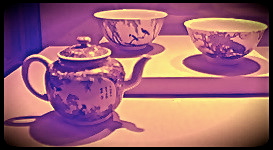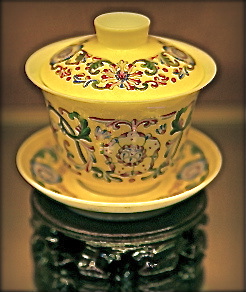
Lù Yǔ 陸羽
Tea has been enjoyed for millennia as a central aspect of culture, daily life, and health. China’s Yunnan province has pride in its lineage of tea plants, where the first tea plant survived the ice age. Cultivation of ceremonious tea drinking developed significantly in the Tang dynasty when Lù Yǔ 陸羽 composed the Cha Jing 茶經, early definitive compilation which advised the ceremonious consumption of fresh green tea using mainly the spring tips of Camellia sinensis tea leaves.
With its bitter sweet flavor, tea influences the heart and in so doing, expresses the heart’s ability to stimulate the clear mind. As an instrument to open the heart, stimulating but calming at the same time, perception shifts and one absorbs the specific energy and minerals of the earth from where the tea grew, offering a meditative sense and poetic sight.

Fermenting enzymes of tea benefit digestion, wash the intestines and detoxify fats and cholesterol. Green teas are energetically cold and are best in summertime and for people with warmer constitutions, or balanced with warmer herbs. Darker, aged teas [Pu’erh and red teas] are fermenting. Like a living organism, they add to a person’s QI and are better for people with colder stomach QI. When tea is harvested, whether fermented, or not, or not processes at all, etc. determines the type of tea, its essence and its attributes. This revered plant, draws from the essence of the earth and imbues a heavenly sense that is revered by the countless many.

gaiwan
Tea drinking offers many health benefits that are validated by science, however, one should also recognize that drinking tea is something unto itself, to be done for its own sake and not to fulfill any ulterior purpose ~ Only in this way can the “taste of sunlight, wind, and clouds” mysteriously be sensed by the tea drinker. Tea drinking engenders empathy with nature and kinship with one’s fellow beings ~Taoist Sentiment
Enjoy!